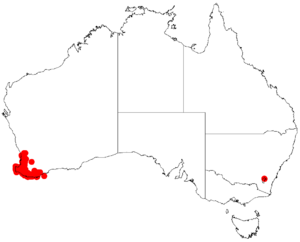Acacia divergens facts for kids
Quick facts for kids Acacia divergens |
|
|---|---|
| Scientific classification | |
| Genus: |
Acacia
|
| Species: |
divergens
|
 |
|
| Occurrence data from AVH | |
Acacia divergens is a type of shrub, which is a woody plant smaller than a tree. It belongs to the Acacia plant family and is found naturally in Western Australia.
Contents
What Does Acacia divergens Look Like?
This special shrub usually grows to be about 0.4 to 2.5 meters (1.3 to 8.2 feet) tall. It often has a main stem and long, thin branches that can hang downwards. The branches are usually smooth or have a few tiny hairs. They also have fine yellow lines on them.
Leaves and Flowers
The leaves of Acacia divergens are called phyllodes. These are like flattened leaf stalks that do the job of leaves. They are always green and have a sharp point. Each phyllode is shaped like a triangle or a wedge, about 6 to 10 millimeters (0.24 to 0.39 inches) long and 3 to 8 millimeters (0.12 to 0.31 inches) wide.
The plant blooms with cream-yellow flowers from August to November. The flowers grow in small, round clusters, with each cluster having 5 to 10 flowers.
Seeds and Pods
After the flowers bloom, long, curved, or twisted seed pods appear. These pods can be up to 7 centimeters (2.8 inches) long and 2 to 3 millimeters (0.08 to 0.12 inches) wide. Inside the pods are shiny brown seeds that are about 2.5 to 3 millimeters (0.10 to 0.12 inches) long.
Where Does Acacia divergens Grow?
You can find Acacia divergens in several areas of Western Australia. These include the southern Wheatbelt, Peel, South West, and Great Southern regions.
This shrub often grows near water, like along rivers or around swamps and other wet places. However, it can also be found in drier spots. For example, it grows in clay-like soil with laterite (a type of rock) in Jarrah forests. It also lives in coastal heath areas, which are open lands with small shrubs near the coast.
Similar Plants
Acacia divergens is part of a group of plants known as the A. biflora group. It also looks quite similar to another plant called A. robiniae.

